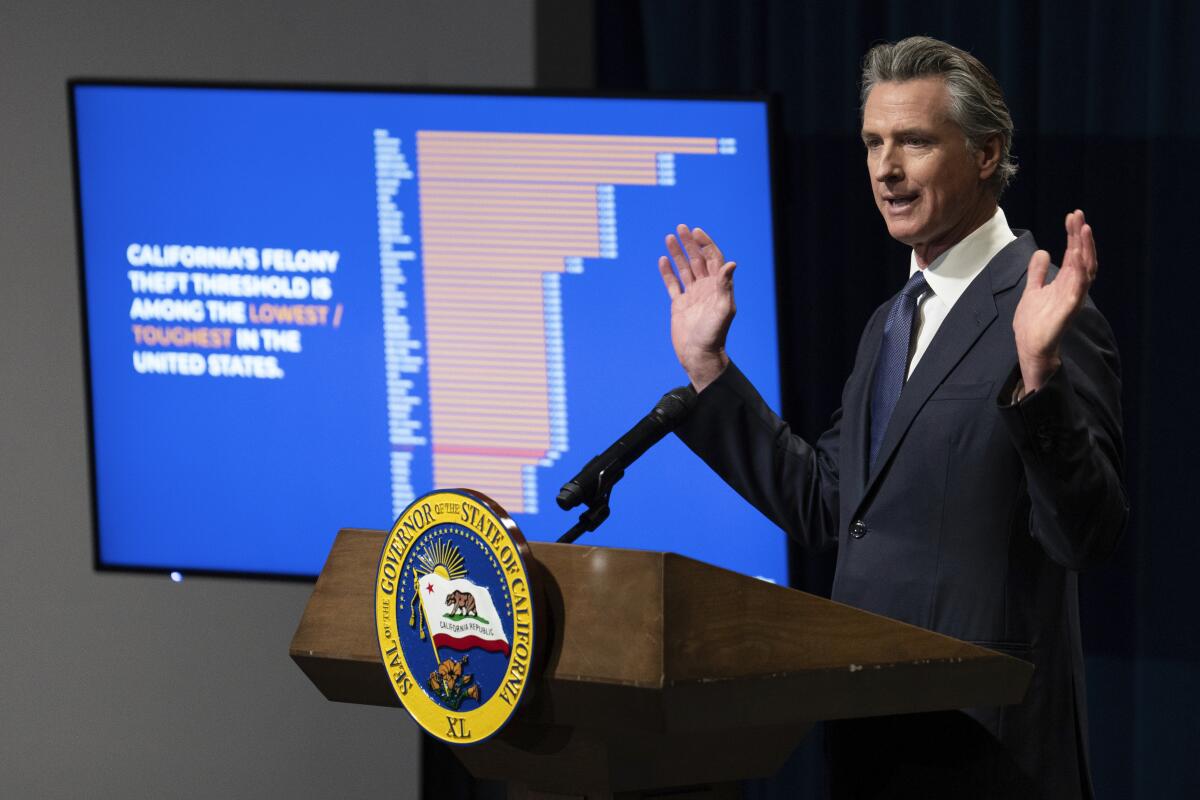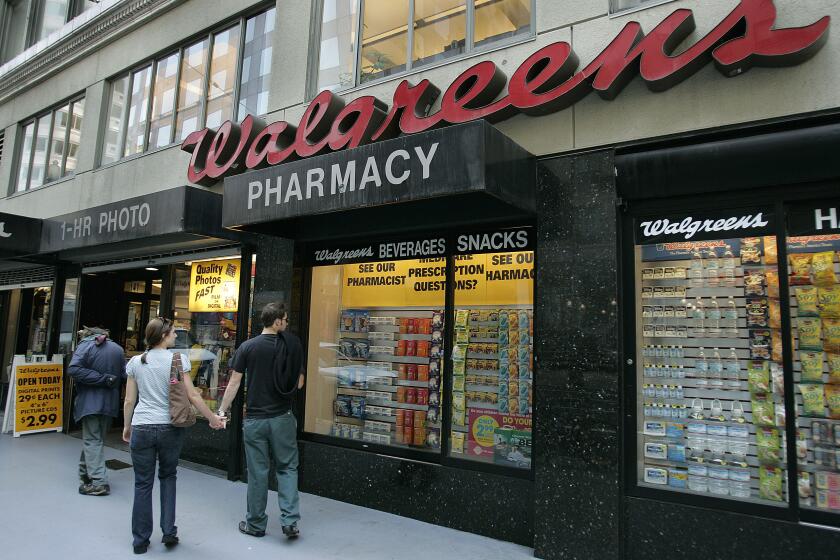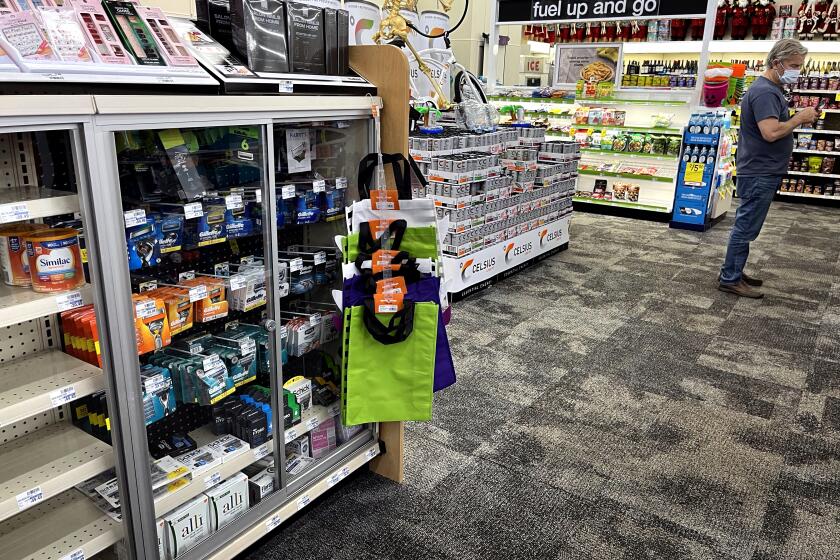Newsom suggests ways to crack down on property crime without dismantling Proposition 47

- Share via
SACRAMENTO — Gov. Gavin Newsom said he can relate to business owners and other residents angered by smash-and-grab thefts from California stores. One of the wine shops he owns in San Francisco was burglarized at least three times in 2021.
But the problem won’t be solved, Newsom said, by changing Proposition 47, the 10-year-old law voters approved to change some felonies to misdemeanors, including thefts of items worth less than $950, which some people blame for a rise in thefts. Instead, he wants to tackle retail theft with legislation to crack down on what he called “professional thieves.”
“We can do it without reforming [Proposition 47] and going back to the voters,” Newsom said Wednesday as he presented his annual budget proposal, which includes $374 million to combat retail theft. “I want people to know this is unacceptable. Folks need to be held to account. There’s nothing right about this.”
When a reporter asked Newsom about Proposition 47, he turned to the screen onstage beside him and began playing an animated bar graph outlining states’ thresholds for felony theft. Most were higher than California’s $950.
“Turns out, well, Texas, you have to steal more than $2,500 before it’s a felony,” Newsom said.
Though other states do have higher thresholds, critics of Proposition 47 argue that Texas does prosecute repeat offenders who have committed multiple incidences of theft. In California, those critics say, the state does not hold repeat offenders accountable.
Inconsistent information makes it difficult for California lawmakers to draft proposed laws to combat retail theft.
The Democratic governor’s comments come as some lawmakers in his own party are signaling an interest in changing Proposition 47 to address these grievances.
“I’m calling for new legislation to expand criminal penalties for those profiting on retail theft and auto burglaries,” he said in an announcement proposing six ways the Legislature can crack down on theft. “These laws will make California safer and bolster police and prosecutor tools to arrest and hold professional criminals accountable.”
He proposed ideas include aggregating theft amounts and creating penalties targeting those who resell stolen property and burglarize cars .
Lawmakers aren’t letting the lack of useful data on the causes of retail theft stop them from pushing solutions to a problem they can’t define.
Some efforts have already been made to address these crimes.
A law by Sen. Nancy Skinner (D-Berkeley) that went into effect last year put restrictions on online marketplaces where stolen goods are believed to be sold, but some have expressed the need to address loopholes in that law.
And last year, Newsom sent more than $267 million to 55 cities and counties across California to increase arrests and prosecutions for organized retail crime, which the Newsom administration called the largest spending on retail theft in the state’s history.
State lawmakers praised Newsom’s suggestions, but the prospect of those ideas turning into successful legislation this year remains unclear.
“The governor came out with some parameters and we applaud that,“ Kevin McCarty (D-Bakersfield), the chair of the Assembly’s public safety committee, told The Times. “We’re still very open. We have a lot of different views that are in our caucus so we’re not putting anything off the table and nothing is guaranteed to be on the table.”
McCarty and Assemblymember Laura Friedman (D-Glendale) filed legislation last week to address retail theft in California, but it was little more than an empty placeholder for a bill that has yet to be crafted. McCarty said they have until March to come up with the bill’s language.
“We have multiple weeks and months to flush it out. I think he’s putting his thoughts out there and we have our thoughts, so it’s early in the process,” he said. “If we can forge a path forward without touching [Proposition] 47, we’ll take a look at that. But we’re not saying that that is a foregone conclusion.”
Fifty-nine percent of voters said they would support changing the law to potentially allow for more felony prosecutions.
However, McCarty said if the legislature did decide to put the issue before voters on a statewide ballot measure, it would be to “narrowly address some of the shortcomings,” not to repeal it.
McCarty said he agrees with state efforts to give “second chances” to individuals who served time in county or state jail, adding that he would be open to legislation that focuses on diversion programs and drug treatment programs.
Newly minted Assembly Speaker Robert Rivas (D-Hollister) appointed a select committee on retail theft, which already hosted the first of several anticipated hearings last month.
Rachel Michelin, president of the California Retailers Assn. who has spoken on behalf of retailers in the state, said that in the past the public safety committee “hasn’t paid attention to this” topic as closely as it is now.
“Now the tide has changed under the new leadership of Speaker Rivas, who has made this a priority,” she said.
One of Michelin’s hopes is to get legislation that will “actually do something,” specifically with repeat offenders. And if that means a new ballot measure to alter Proposition 47, she supports it. Anything that would be put on the ballot needs to be submitted no later than June 27, the constitutional deadline requirement.
“If we want to show we are making changes and people want to feel like they have a say,” she said, “they will want to be able to vote on it themselves.”
More to Read
Sign up for Essential California
The most important California stories and recommendations in your inbox every morning.
You may occasionally receive promotional content from the Los Angeles Times.

















